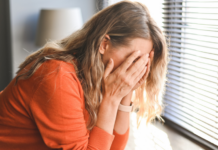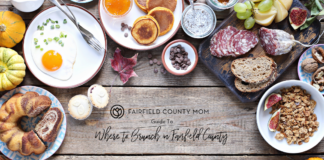 They say that grief comes in waves. I never quite understood that until I was in the midst of my own grief.
They say that grief comes in waves. I never quite understood that until I was in the midst of my own grief.
Going along with the day-to-day routines one moment and then getting dragged under by the overwhelming feeling that my lungs were losing air and I was physically being pulled down by something that I couldn’t fight.
The year leading up to my Grandmother’s diagnosis and death had already been hard on my family. We were in the grasp of a global pandemic, and due to my grandparents’ ages, we were adhering to the policy of staying home or away from them to keep them safe.
We always visited them a few times a year, piling up the five of us at the time in the car for a three-and-a-half-hour road trip up Route 17 to Binghamton, New York, and having them visit every summer for a week at a time. Then we had to lean heavily on Zoom, and FaceTime calls to see one another. I remember being so thankful for the technology.
Around May 2020, my grandma came down with laryngitis. I remember calling her on the phone, and she asked if I liked her “sexy voice.” She always asked this when she had laryngitis, and I always told her that I loved it and that it was, in fact, sexy.
By August, her voice had not returned to normal, and both my aunt and I had been pushing her to insist that her physicians do more thorough testing. I’ll never forget the call when she told me it was cancer.
Based on her age and her heart’s state, I knew it wasn’t good. My Grammie fought hard, but the cancer fought harder and spread fast. By January 2021, she had lost her fight.
We were grieving the beautiful matriarch of my family while she was still here with us. For my children, they had to say goodbye while her body and mind were still alive.
The day before she entered Mercy House Hospice, I made the round trip ride to Binghamton, nine months pregnant and with my three children, so that they could have a final goodbye with their great grandmother. Per hospice rules, they wouldn’t be allowed to enter the building based on their ages.
That last day watching my grandmother with my then 9-year-old, 7-year-old, and almost 2-year-old was the most beautiful and simultaneously heartbreaking day of my life.
I watched them share little moments one-on-one with her, cuddled up in her bed. My daughter and grandpa made a silly show wearing her wigs to make her belly laugh while dancing around the room. My older son, stoic and strong, would lean in and kiss her on the head, and she would whisper that he was the greatest thing she could ever ask for. And my little one, confused by her loss of hair, would peer around the door frame, and when she would reach out for him, he would yell and run down the hall.
We sang our favorite songs with all of our favorite items of hers, and when we sang The Teddy Bear Picnic, I watched her heart break as she realized this was the last time she would ever be with the ones she so fondly referred to as “her babies.” Mid-song, she picked up Freddie Bear, the bear she had since childhood, and covered her face while the tears streamed down.
Then and there, a piece of me felt like I would die alongside her. But I was weeks away from birthing new life, so I continued to put one foot in front of the other and stay strong for my babies.
It was winter, I was pregnant, and the ride home was long. We had to leave, knowing it was the last time they would be with her. I’ve tried to be as transparent with my children as possible, so they understood that they would not be able to see her in hospice. I’m not sure that anyone can truly grasp the permanence of not seeing someone they love so dearly ever again, whether prepared for it or not, whether young or old.
I remember the stifled sound of crying on and off during that long car ride home. I remember wanting to scream into the abyss and take away the pain for my darling grandmother and innocent children. I remember feeling so utterly helpless, angry, and sick simultaneously.
We drove up again on Saturday morning, five days later. This time, only I went to hospice to see her. The kids went to her window to blow her kisses, but she was asleep. I knew then that it was the last time we would occupy the same physical space in this life.
She somehow held on for another five days. I remember waking up like a bolt went through me in the middle of the night. Just when I was jolted awake, I looked over, and my phone, which I slept with on silent, lit up. My aunt was calling to let me know that my grandmother had passed.
From the various signs I continue to receive, I have come to believe that my grandmother jolted me awake that night, passing through on her journey. My grandfather had a similar experience that night, jolted awake by what he could only describe as her spirit flowing through him and a bright light entering his dark room. The hospice called within minutes afterward to let him know that she was no longer with us.
Grieving my grandmother was incredibly hard. I had never lost someone so close to me. This woman had effectively raised me. I modeled my parenting, who I strive to be as a partner to my husband, and who I am as a friend after her example. I felt robbed of time. COVID had robbed us; cancer had robbed us, and to watch her suffer was incredibly unfair.
To have her miss the birth of my last child by a mere five weeks was the most painful thing. She used to ask me toward the end if I thought my babies would remember her. I vowed that they would never forget her. But my baby, who we named after her father, would not come home to her like all of the others before him. This is one of the most unfair scenarios I’ve ever been forced to accept.
Aside from the kids, my grandpa kept me going. Knowing how alone he was both physically and emotionally kept me motivated to throw on a smile when we would FaceTime or even just through the phone. I firmly believe you can hear a smile on the other end of the line.
My grandparents were married in 1959 and were together until my grandmother died in 2021. They came from a time when the man left the house to provide, and the woman took care of everything inside the home. He would call me and ask how to warm up a rotisserie chicken for dinner or food we had cooked and frozen with directions. He was so accustomed to my grandmother doing it all. He truly was broken without her.
It’s not that the distraction of my grandfather needing us made it easier to mourn my grandmother, but it was just that—a distraction. And in many ways, he was still a strong connection to her. We were still calling her home every day. We were still visiting her home to be with him. We could feel that closeness to her through the love of her life.
When my grandfather contracted COVID last year, we knew there was a slim chance that his heart would be able to fight through. He was in the ICU, and we were advised to have his last rights read to him. He clawed out of the ICU and hung on for quite some time. We even thought he would come home at one point.
Eventually, it was clear that he would need to move to hospice. Twenty months after my grandmother passed in the same space, we moved my grandfather in. Two doors down from where I last saw my grandmother in the flesh. He was immobile, but his mind was there. He knew who we were, and he knew why he was there. Twenty months made a difference for my older children; they were now allowed to come in and visit their grandfather in this space.
They had questions about where their great grandmother had been. I think they found comfort in seeing how well cared for he was, how, unlike a hospital the space was, and knowing this was the same experience that their great grandmother had. Like my experience, I had to eventually walk them out of there, knowing they likely would never occupy a space with him again. The parallels were similar, but I’m not sure which were harder.
I traveled back up alone a few days later when similar to my grandmother, I knew he was closer to the end, and the kids shouldn’t see him that way. I planned to spend the weekend with my aunt at the house, days in hospice holding his hands and telling him how loved he was.
The first night we left him to go to dinner and then back to the house. Around 11:45 p.m., I recall talking to my aunt in my grandfather’s rocker until I drifted off to sleep. I wasn’t asleep a full hour before she came out to wake me. I heard her call my name, and I yelled out. I knew immediately that he was gone.
We went over right away to say goodbye to my sweet PopPop. His body was still warm, and he had a slight smile. My aunt thinks he must’ve seen my grandmother’s face welcoming him in those final moments, prompting the turn in his lips. It was a completely different experience than the middle-of-the-night call I had received twenty months earlier. Still so painful, but in many ways, such an honor to be the person in the room giving those final hugs and kisses to someone who has just passed on.
The next day I had to drive back home the three and half hours to my family. Only my husband knew that my grandfather had passed. We didn’t want the kids to know before I was back. I brought some of my grandfather’s favorite things, including a picture pillow I had made for him of my grandmother on her wedding day. I carried it in from the car, and they immediately knew he was gone.
Learning to grieve while guiding my children through their own grief isn’t easy. There is no right or wrong way, but simply what works for us. We don’t grieve in a synchronized manner. We all go through ebbs and flows and have suffered immeasurable losses in the last two and a half years.
We have learned to make space for one another. We have normalized crying and talking about our feelings. We have spoken their memories into our daily lives. So much so that the baby who missed his great grandmother by five weeks can recognize who she is by name and point her out in photos. Sometimes one of the kids cries, and it sets me off, and I end up in a puddle beside them, but I try not to take over their feelings and let them feel them.

























This 💔🙏🏼❤️